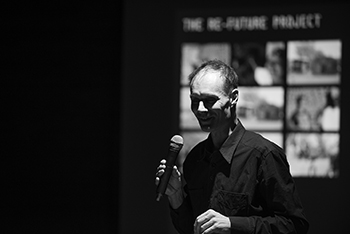Latest News Archive
Please select Category, Year, and then Month to display items
04 April 2024
|
Story Lunga Luthuli
|
Photo SUPPLIED
 Dr Juliet Kamwendo champions gender-inclusive climate action in Africa. Her expertise at the recently held AFR100 workshop highlighted vital steps towards sustainable and equitable development.
Dr Juliet Kamwendo champions gender-inclusive climate action in Africa. Her expertise at the recently held AFR100 workshop highlighted vital steps towards sustainable and equitable development.
Dr Juliet Kamwendo, Lecturer and Programme Director for Gender Studies in the Centre for Gender and Africa Studies at the University of the Free State, is spearheading efforts to integrate gender considerations into Africa's climate restoration agenda. Reflecting on her involvement, Dr Kamwendo stated, "This is particularly crucial, as women make up almost 50% of the population in Africa, and the depletion and degradation of land affect them disproportionately."
She recently served as a gender expert at the AUDA-NEPAD AFR100 workshop in Ouagadougou, Burkina Faso, from 25 to 29 March 2024. This initiative aims to restore forests and degraded land across Africa by 2030, with a focus on gender equality.
The workshop emphasised the integration of gender perspectives into the AFR100 project, acknowledging the disproportionate impact of land degradation on women. Dr Kamwendo's expertise highlighted the need to empower women in climate change interventions, addressing existing gender inequalities exacerbated by environmental degradation.
“Women – who are primarily responsible for household food security and water provision – bear the brunt of environmental degradation, leading to increased workloads, reduced income opportunities, and heightened vulnerability to climate-related disasters. Furthermore, the loss of forest cover and biodiversity further exacerbates the challenges faced by women, particularly in rural areas where they depend heavily on natural resources for their livelihoods,” added Dr Kamwendo.
Her participation highlights academia's crucial role in fostering inclusive and sustainable development, emphasising interdisciplinary collaboration to tackle complex environmental challenges. Through initiatives such as AFR100, stakeholders are working towards a more resilient and gender-responsive future for Africa.
Arts and Science collaborate in creating sustainable futures
2016-03-16

Creating a future where living green is the status quo: Dr Keith Armstrong
Photo: Lihlumelo Toyana
|
In creating partnerships across disciplines, mankind gains a deeper understanding of how to create the future. This is the premise upon which Dr Keith Armstrong bases his research and experimental art. Dr Armstrong is an Australian Hybrid Media artist and a Senior Research Fellow at Queensland University of Technology in Australia.
Artists that make things happen
“My journey has shifted from an artist that makes things to an artist that makes things happen,” he said at the New Futures: Innovations in Arts and Science public talk recently at Oliewenhuis Art Museum. The talk, organised by the Johannes Stegmann Art Gallery, was part of a series of artistic projects presented by the Programme for Innovation in Arts and Development (PIAD). This initiative is spearheaded by the UFS and Vrystaat Arts Festival, kindly supported by The Andrew W. Mellon Foundation.
Dr Angus Hervey – an Australian writer, technologist and science communicator– was also a speaker at the event. Dr Hervey is a co-founder of Future Crunch, a platform for intelligent, optimistic thinking about the future. He strongly shares Dr Armstrong’s passion and viewpoints.
Dr Armstrong’s work is motivated by social and ecological justice. His non-traditional research and more than 60 artworks serve to evoke audiences to create sustainable futures.
Building the future
Dr Armstrong is in the process of making “things happen” in informal settlements across the Free State by means of his Re-Future project. The project brings together sustainability, community development, and creative action. It moves away from conventional art practices and instead offer a platform to rethink and therefore re-future our practices of sustainability.
The Re-Future project has been initiated through a collaboration between the Johannes Stegmann Art Gallery, the UFS Centre for Development Support (CDS) and Qala Phelang Tala (QPT) and the Vrystaat Art Festival.
According to Anita Venter, a lecturer at CDS and founder of QPT, empowerment is at the centre of the artist-initiated, yet community-controlled project. “It gives a new direction and new hope to the community,” she said.
For more information
Angela de Jesus, dejesusav@ufs.ac.za or +27(0)51 401 2706